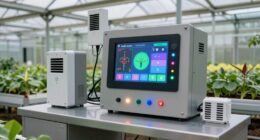Discover how hydrogen fuel cells excel in cold weather, providing sustainable energy for various applications. Offering versatility and reliability, they operate efficiently even in sub-zero temperatures. Zero emissions make them environmentally friendly, cutting carbon footprints. Their proven performance in tough conditions like hurricanes and winter storms highlights their reliability. With efficiency rates ranging from 40% to 60%, they save costs compared to combustion generators. Adaptable and customizable, they suit diverse needs. Partnered with key organizations, fuel cells advance technology and sustainable solutions. See how hydrogen fuel cells can benefit you in tough conditions and beyond.
Key Takeaways
- Hydrogen fuel cells reliably operate in subzero temperatures.
- Demonstrated performance in cold weather conditions like winter storms.
- Ideal for applications requiring consistent power in freezing climates.
- Cold weather does not affect the efficiency of hydrogen fuel cells.
- Essential for applications where traditional power sources struggle in cold environments.
Zero-Emission Power Benefits
Experience the environmental advantages of hydrogen fuel cells through their zero-emission power benefits. Fuel cell power offers a clean energy solution that's both efficient and sustainable.
Hydrogen fuel cells excel in cold weather and subzero temperatures, proving to be reliable even in harsh operating conditions. These cells produce no harmful emissions, making them an environmentally friendly choice for various applications.
By utilizing hydrogen fuel cells, you not only reduce your carbon footprint but also eliminate costs associated with toxic by-products. The by-products of fuel cells are simply heat and water, which further highlights their eco-friendly nature.
With an energy efficiency range of 40% to 60%, hydrogen fuel cells are a smart alternative to traditional power sources. Embrace the future of energy with hydrogen fuel cells, and reap the benefits of lower operational costs and a cleaner, greener planet.
Reliability in Tough Conditions

In tough conditions like hurricanes, deserts, and winter storms, hydrogen fuel cells have demonstrated robust reliability. These fuel cells operate within a wide range of temperatures, making them suitable for extreme conditions where other power sources may falter. Their ability to function in cold temperatures showcases their reliability in challenging environments.
For instance, during Hurricane Michael, hydrogen fuel cells continued to provide power when traditional systems failed. This proven performance in tough conditions highlights the durability and effectiveness of hydrogen fuel cells. Industries such as material handling warehouses widely use them, further emphasizing their dependability.
Additionally, hydrogen fuel cells play an essential role in corporate sustainability programs, underlining their effectiveness in various applications. Their consistent operation in demanding scenarios showcases their resilience and suitability for providing continuous power supply in the face of adversity.
Enhanced Energy Efficiency

Enhancing energy efficiency, hydrogen fuel cells offer significant advantages over internal combustion engines, with efficiency rates ranging from 40% to 60%. The improved energy efficiency of fuel cells plays an essential role in various applications, especially in material handling settings. For instance, in warehouses, fuel cell forklifts powered by hydrogen technology not only extend mileage range but also enhance operational efficiency, ensuring continuous and reliable power for various operations. This efficiency translates into significant cost savings, with hydrogen fuel cells cutting operational costs by up to 84% when compared to combustion generators. The table below highlights how fuel cells excel in energy efficiency, promoting operational effectiveness and sustainability in cold weather conditions.
| Advantages of Fuel Cells in Energy Efficiency | Benefits | Applications |
|---|---|---|
| Higher efficiency rates | 40% to 60% efficiency | Material handling |
| Cost-effectiveness | Up to 84% operational cost savings | Warehouse operations |
| Enhanced operational efficiency | Extended mileage range | Forklifts |
| Sustainability | Reliable power supply | Cold weather performance |
Scalability for Diverse Applications

With its ability to adapt to a wide range of applications, hydrogen fuel cells offer a scalable and versatile power solution for various industries.
The scalability of fuel cells allows for their efficient use in powering diverse applications, ranging from commercial vehicles to drones. Modular products enhance reliability and serviceability, catering to different power needs with ease. Engineers can customize fuel cells to meet specific requirements, ensuring flexibility and efficiency in operation.
The reliability of fuel cells in diverse applications not only meets but exceeds expectations, making them a preferred choice for various industries.
The scalability benefits of fuel cells translate into cost savings in purchasing and utilizing them across different sectors. Collaborations with national and international organizations further drive the advancement of fuel cell technology for an even broader range of applications, solidifying their position as an innovative and adaptable power solution.
Cost Savings and Operational Efficiency

You'll find that hydrogen fuel cells deliver efficient and cost-effective operations across various industries. They not only slash operational expenses markedly but also streamline processes, saving you time and resources.
Embracing hydrogen fuel cells can lead to enhanced operational efficiency and substantial cost savings in your operations.
Efficiency in Cold
In cold weather conditions, hydrogen fuel cells demonstrate significant cost savings and operational efficiency compared to other zero-emission technologies.
When it comes to efficiency in the cold, consider the following:
- Fuel Efficiency: Hydrogen fuel cells maintain their efficiency levels even in low temperatures.
- Temperature Conditions: Hydrogen fuel cells operate well in cold climates, ensuring reliable performance.
- Range Maintenance: Hydrogen fuel cell buses experience less range decrease in cold weather compared to battery electric buses.
- Operational Efficiency: Cold weather operational challenges are mitigated by the consistent performance of hydrogen fuel cells.
- Cost Savings: The overall cost-effectiveness of hydrogen fuel cells in extreme temperature conditions makes them a favorable choice for transit agencies.
These factors highlight the advantages of utilizing hydrogen fuel cells, particularly in cold weather environments, where operational efficiency and cost savings are paramount.
Cost-Effective Operations
Hydrogen fuel cells deliver substantial cost savings and operational efficiency, setting them apart as a top choice for businesses seeking sustainable power solutions.
With up to 84% lower operational costs compared to combustion generators, these fuel cells offer a cost-effective solution that enhances operational efficiency across industries.
The energy efficiency of fuel cells, ranging from 40% to 60%, surpasses that of internal combustion engines, further contributing to their economical operation.
Even in sub-freezing temperatures, hydrogen fuel cells continue to provide reliable power, ensuring uninterrupted business operations without excessive costs.
By reducing labor, time, space, and peak power demands, fuel cells prove to be a sustainable and financially advantageous choice for companies looking to optimize their operational costs.
Embracing hydrogen fuel cells not only leads to reduced expenses but also improves overall productivity by minimizing downtime, making them a smart investment for businesses prioritizing operational efficiency and sustainability.
Collaborations and Industry Partnerships

You should start by highlighting the industry collaborations that are essential for advancing hydrogen fuel cell technology.
These strategic partnerships within the fuel cell sector play a significant role in driving innovation and expanding applications.
Collaborative efforts in the hydrogen industry are key to accelerating progress towards sustainable and efficient power solutions.
Industry Collaborations for Hydrogen
Numerous industry collaborations with key organizations like the U.S. Department of Energy and the Hydrogen Council drive advancements in fuel cell technology. These collaborations are important for promoting the benefits of hydrogen fuel cells and pushing forward fuel cell technology in various commercial applications.
National and international partnerships are pivotal in expanding the utilization of hydrogen fuel cells across different industries. By working together, these collaborations foster innovation, research, and development in the hydrogen fuel cell technology sector.
Industry partnerships play a critical role in scaling up the production and adoption of hydrogen fuel cells, paving the way for a more sustainable energy future.
- Partnerships with the U.S. Department of Energy and the Hydrogen Council drive advancements in fuel cell technology.
- Collaborations aim to promote the advantages of fuel cells in various commercial applications.
- National and international partnerships play a key role in expanding the use of hydrogen fuel cells.
- Collaborations drive innovation, research, and development in the field of hydrogen fuel cell technology.
- Working with industry partners is important for scaling up production and adoption of hydrogen fuel cells.
Strategic Partnerships in Fuel Cell Sector
Strategic partnerships in the fuel cell sector involve collaborations with key organizations such as the U.S. Department of Energy, FCHEA, and the Hydrogen Council to promote the advantages of fuel cells and explore their applications in various industries. These collaborations are vital for advancing fuel cell technology and driving the adoption of sustainable power solutions.
By working together, industry players can overcome energy challenges and innovate towards a cleaner future.
Industry partnerships play a pivotal role in expanding the use of fuel cells in diverse commercial applications, ranging from powering vehicles to enabling unmanned aerial systems like drones. Leveraging these partnerships with national and international organizations, fuel cell companies can enhance their capabilities, foster innovation, and address pressing energy challenges more effectively.
Through strategic collaborations, the fuel cell sector can continue to grow and make significant contributions to sustainable energy solutions.
Collaborative Efforts in Hydrogen
Collaborating with national and international organizations and forming industry partnerships is necessary in advancing the utilization of hydrogen fuel cells across various sectors. Such collaborative efforts drive innovation and progress in fuel cell technology, enhancing its applications and benefits for industries and consumers alike.
Here are some key points to keep in mind:
- Collaboration: Engaging with entities like the U.S. Department of Energy and FCHEA highlights the advantages of hydrogen fuel cells.
- Fuel Cell Technology: Joint efforts aim to advance fuel cell technology for diverse industrial applications.
- Applications: Industry partnerships, such as with the Hydrogen Council, propel the growth of commercial applications for hydrogen fuel cells.
- Industry Partnerships: Collaborations guarantee scalability and reliability of fuel cells to meet customer power needs effectively.
- Scalability and Reliability: Working with partners helps in cost savings, enhances serviceability, and boosts the adoption of fuel cell technology.
These collaborative initiatives are essential in driving the widespread adoption and success of hydrogen fuel cells in various sectors.
Frequently Asked Questions
Do Hydrogen Fuel Cells Work in Cold Weather?
Yes, hydrogen fuel cells work in cold weather conditions. They maintain efficiency and offer better performance than battery electric vehicles. Real-world data and NASA's success in extreme temperatures support their reliability, making them a practical choice.
How Does Temperature Affect Hydrogen Fuel Cells?
In extreme temperatures, hydrogen fuel cells showcase greater efficiency and power production while reducing mass crossover and enhancing durability. They offer adaptability, reliability, and superior performance, supporting productivity and sustainability goals across industries.
What Are Three Drawbacks to Hydrogen Fuel Cells?
Forget easy wins with hydrogen fuel cells! High costs, regulatory mess, and lackluster efficiency hinder their shine. But fear not, tech strides aim to curb expenses and make these cells a future powerhouse.
What Happens When Hydrogen Gets Cold?
When hydrogen gets cold, its density increases, affecting flow through fuel cell components. Reaction rates decrease, leading to reduced electricity production. Cold temperatures impact electrolyte membrane conductivity. Proper insulation and heating systems are essential for best performance.
How Does Cold Weather Affect the Performance of Hydrogen Fuel Cells?
Cold weather can impact the efficiency of global hydrogen fuel station growth due to the lower operating temperatures. The cold can slow down the chemical reactions in the fuel cells, resulting in decreased power output. To combat this, insulation and heating systems are used to maintain optimal performance in colder climates.
Conclusion
To sum up, hydrogen fuel cells offer impressive cold weather performance and applications.
Did you know that fuel cells can operate at temperatures as low as -40 degrees Celsius, making them a reliable power source even in the toughest conditions?
With enhanced energy efficiency, scalability for diverse applications, and cost savings, hydrogen fuel cells are paving the way for a greener and more sustainable future.
So why not consider incorporating this innovative technology into your operations today?









